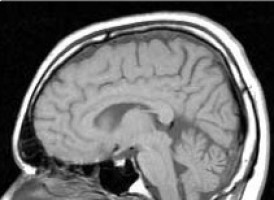
Patients with advanced melanoma who develop metastases in the leptomeninges, the fluid filled membranes surrounding the brain and spinal cord, have an extremely dismal prognosis.
Most patients only survive for 8 to 10 weeks after diagnosis.
One reason for this poor prognosis is that very little information is known about the molecular development of leptomeningeal melanoma metastases (LMM), making it difficult to develop effective therapies.
Researchers in Moffitt Cancer Center's Donald A. Adam Melanoma and Skin Cancer Center of Excellence and the Department of Neuro-Oncology sought to change this by performing an extensive analysis of the molecular characteristics of the cerebrospinal fluid of patients with LMM.
Their findings were published in Clinical Cancer Research, a journal of the American Association for Cancer Research.
Cancer development and progression are highly regulated by intricate interactions between cancer cells and the surrounding environment.
Melanoma cells that invade and metastasise into the leptomeninges interact with the surrounding cerebrospinal fluid.
Moffitt researchers wanted to improve their understanding of the development of LMM by analysing the protein and RNA composition of cerebrospinal fluid from patients with LMM.
They compared the molecular profiles of 8 control patients without LMM to 8 patients with LMM, including one LMM patient who had an extraordinary response to treatment and was still alive more than 35 months after diagnosis.
They discovered that the cerebrospinal fluid from LMM patients was enriched for proteins involved in innate immunity, proteases and the IGF-signalling pathway.
The most commonly altered protein was TGF-β1.
Interestingly, the one patient who had an extraordinary response to treatment displayed high levels of these proteins at baseline, but expression levels decreased as the patient responded to treatment.
However, the protein expression patterns in the remaining LMM patients who had poor responses to treatment were high at baseline and remained high throughout treatment and disease progression.
The researcher team, led by Keiran Smalley, Ph.D., director of the Donald A. Adam Melanoma and Skin Cancer Center of Excellence and Peter Forsyth, M.D., Chair of the Department of Neuro-Oncology, hypothesised that the cerebrospinal fluid of LMM patients could impact melanoma cells by modulating their molecular profile.
They confirmed this hypothesis by incubating cerebrospinal fluid from the LMM patients with melanoma cells and discovered that the fluid was able to induce activation of proteins and signalling pathways involved in malignant progression, including the PI3K/AKT pathway, integrins, B cell signalling, mitotic cell cycle progression, TNFR, TGF-β and oxidative stress.
Their findings demonstrate that the cerebrospinal fluid from LMM patients who did not respond to treatment promoted survival of melanoma cells, while the cerebrospinal fluid from the extraordinary responder did not promote survival.
These observations suggest that molecules exist within the cerebrospinal fluid that can stimulate melanoma cell survival and prevent cell death.
The researchers reported that one of these survival molecules is TGF-β.
The patient who responded well to treatment had very low to undetectable levels of cerebrospinal fluid TGF-β, while those patients who did not respond to treatment had much higher levels of TGF-β.
The researchers hope that their data will provide important knowledge about LMM and offer insights into potential therapeutic targets.
"It is likely that the environment of LMM is a key regulator of both disease progression and therapeutic response. Improved knowledge about the microenvironment of LMM may allow novel therapeutic strategies to be developed that can delay disease progression," explained Smalley.